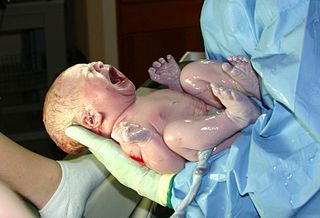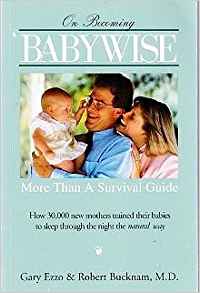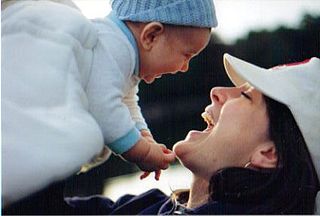Related Research Articles

Developmental psychology is the scientific study of how and why humans grow, change, and adapt across the course of their lives. Originally concerned with infants and children, the field has expanded to include adolescence, adult development, aging, and the entire lifespan. Developmental psychologists aim to explain how thinking, feeling, and behaviors change throughout life. This field examines change across three major dimensions, which are physical development, cognitive development, and social emotional development. Within these three dimensions are a broad range of topics including motor skills, executive functions, moral understanding, language acquisition, social change, personality, emotional development, self-concept, and identity formation.

Parenting or child rearing promotes and supports the physical, emotional, social, and intellectual development of a child from infancy to adulthood. Parenting refers to the intricacies of raising a child and not exclusively for a biological relationship.

An infant is a formal or specialised synonym for the common term baby, meaning the very young offspring of human beings. The term may also be used to refer to juveniles of other organisms. A newborn is, in colloquial use, an infant who is only hours, days, or up to one month old. In medical contexts, newborn or neonate refers to an infant in the first 28 days after birth; the term applies to premature, full term, and postmature infants.
Child abandonment is the practice of relinquishing interests and claims over one's offspring in an illegal way, with the intent of never resuming or reasserting guardianship. The phrase is typically used to describe the physical abandonment of a child, but it can also include severe cases of neglect and emotional abandonment, such as when parents fail to provide financial and emotional support for children over an extended period of time. An abandoned child is referred to as a foundling. Baby dumping refers to parents leaving a child younger than 12 months in a public or private place with the intent of terminating their care for the child. It is also known as rehoming when adoptive parents use illegal means, such as the internet, to find new homes for their children. In the case where child abandonment is anonymous within the first 12 months, it may be referred to as secret child abandonment.

Baby sign language is the use of manual signing allowing infants and toddlers to communicate emotions, desires, and objects prior to spoken language development. With guidance and encouragement signing develops from a natural stage in infants development known as gesture. These gestures are taught in conjunction with speech to hearing children, and are not the same as a sign language. Some common benefits that have been found through the use of baby sign programs include an increased parent-child bond and communication, decreased frustration, and improved self-esteem for both the parent and child. Researchers have found that baby sign neither benefits nor harms the language development of infants. Promotional products and ease of information access have increased the attention that baby sign receives, making it pertinent that caregivers become educated before making the decision to use baby sign.

Thomas Berry Brazelton was an American pediatrician, author, and the developer of the Neonatal Behavioral Assessment Scale (NBAS). Brazelton hosted the cable television program What Every Baby Knows, and wrote a syndicated newspaper column. He wrote more than two hundred scholarly papers and twenty-four books.

Attachment parenting (AP) is a parenting philosophy that proposes methods aiming to promote the attachment of parent and infant not only by maximal parental empathy and responsiveness but also by continuous bodily closeness and touch. The term attachment parenting was coined by the American pediatrician William Sears. There is no conclusive body of research that shows Sears' approach to be superior to "mainstream parenting".

Toilet training is the process of training someone, particularly a toddler or infant, to use the toilet for urination and defecation. Attitudes toward training in recent history have fluctuated substantially, and may vary across cultures and according to demographics. Many of the contemporary approaches to toilet training favor a behaviouralism- and cognitive psychology-based approach.

Attachment theory is a psychological, evolutionary and ethological theory concerning relationships between humans. The most important tenet is that young children need to develop a relationship with at least one primary caregiver for normal social and emotional development. The theory was formulated by psychiatrist and psychoanalyst John Bowlby.

A paternal bond is the human bond between a father and his child.
Child neglect is a form of abuse, an act of caregivers that results in depriving a child of their basic needs, such as the failure to provide adequate supervision, health care, clothing, or housing, as well as other physical, emotional, social, educational, and safety needs. All societies have established that there are necessary behaviors a caregiver must provide in order for a child to develop physically, socially, and emotionally. Causes of neglect may result from several parenting problems including mental disorders, unplanned pregnancy, substance use disorder, unemployment, overemployment, domestic violence, and, in special cases, poverty.

On Becoming Baby Wise: Giving Your Infant the Gift of Nighttime Sleep is a Christianity-based infant management book written by Gary Ezzo and pediatrician Robert Bucknam in 1993. Baby Wise presents an infant care program which the authors say will cause babies to sleep through the night beginning between seven and nine weeks of age. It emphasizes parental control of the infant's sleep, play and feeding schedule rather than allowing the baby to decide when to eat, play and sleep.

Attachment in children is "a biological instinct in which proximity to an attachment figure is sought when the child senses or perceives threat or discomfort. Attachment behaviour anticipates a response by the attachment figure which will remove threat or discomfort". Attachment also describes the function of availability, which is the degree to which the authoritative figure is responsive to the child's needs and shares communication with them. Childhood attachment can define characteristics that will shape the child's sense of self, their forms of emotion-regulation, and how they carry out relationships with others. Attachment is found in all mammals to some degree, especially primates.

Child development involves the biological, psychological and emotional changes that occur in human beings between birth and the conclusion of adolescence. Childhood is divided into 3 stages of life which include early childhood, middle childhood, and late childhood (preadolescence). Early childhood typically ranges from infancy to the age of 6 years old. During this period, development is significant, as many of life's milestones happen during this time period such as first words, learning to crawl, and learning to walk. There is speculation that middle childhood/preadolescence or ages 6–12 are the most crucial years of a child's life. Adolescence is the stage of life that typically starts around the major onset of puberty, with markers such as menarche and spermarche, typically occurring at 12-13 years of age. It has been defined as ages 10 to 19 by the World Health Organization. In the course of development, the individual human progresses from dependency to increasing autonomy. It is a continuous process with a predictable sequence, yet has a unique course for every child. It does not progress at the same rate and each stage is affected by the preceding developmental experiences. Because genetic factors and events during prenatal life may strongly influence developmental changes, genetics and prenatal development usually form a part of the study of child development. Related terms include developmental psychology, referring to development throughout the lifespan, and pediatrics, the branch of medicine relating to the care of children.

Maternal deprivation is a scientific term summarising the early work of psychiatrist and psychoanalyst John Bowlby on the effects of separating infants and young children from their mother although the effect of loss of the mother on the developing child had been considered earlier by Freud and other theorists. Bowlby's work on delinquent and affectionless children and the effects of hospital and institutional care led to his being commissioned to write the World Health Organization's report on the mental health of homeless children in post-war Europe whilst he was head of the Department for Children and Parents at the Tavistock Clinic in London after World War II. The result was the monograph Maternal Care and Mental Health published in 1951, which sets out the maternal deprivation hypothesis.
Attachment-based therapy applies to interventions or approaches based on attachment theory, originated by John Bowlby. These range from individual therapeutic approaches to public health programs to interventions specifically designed for foster carers. Although attachment theory has become a major scientific theory of socioemotional development with one of the broadest, deepest research lines in modern psychology, attachment theory has, until recently, been less clinically applied than theories with far less empirical support. This may be partly due to lack of attention paid to clinical application by Bowlby himself and partly due to broader meanings of the word 'attachment' used amongst practitioners. It may also be partly due to the mistaken association of attachment theory with the pseudo-scientific interventions misleadingly known as attachment therapy. The approaches set out below are examples of recent clinical applications of attachment theory by mainstream attachment theorists and clinicians and are aimed at infants or children who have developed or are at risk of developing less desirable, insecure attachment styles or an attachment disorder.
Infant sleep training refers to a number of different regimens parents employ to adjust their child's sleep behaviors.

Maternal sensitivity is a mother's ability to perceive and infer the meaning behind her infant's behavioural signals, and to respond to them promptly and appropriately. Maternal sensitivity affects child development at all stages through life, from infancy, all the way to adulthood. In general, more sensitive mothers have healthier, more socially and cognitively developed children than those who are not as sensitive. Also, maternal sensitivity has been found to affect the person psychologically even as an adult. Adults who experienced high maternal sensitivity during their childhood were found to be more secure than those who experienced less sensitive mothers. Once the adult becomes a parent themselves, their own understanding of maternal sensitivity will affect their own children's development. Some research suggests that adult mothers display more maternal sensitivity than adolescent mothers who may in turn have children with a lower IQ and reading level than children of adult mothers.
Video interaction guidance (VIG) is a video feedback intervention through which a “guider” helps a client to enhance communication within relationships. The client is guided to analyse and reflect on video clips of their own interactions. Applications include a caregiver and infant, and other education and care home interactions. VIG is used in more than 15 countries and by at least 4000 practitioners. Video Interaction Guidance has been used where concerns have been expressed over possible parental neglect in cases where the focus child is aged 2–12, and where the child is not the subject of a child protection plan.
Video feedback interventions are used in health and social care situations. Typically a “guider” helps a client to enhance communication within relationships. The client is guided to analyse and reflect on video clips of their own interactions. Applications include a caregiver and infant, and other education and care home interactions. Video feedback interventions have also been used where concerns have been expressed over possible parental neglect in cases where the focus child is aged 2–12, and where the child is not the subject of a child protection plan.
References
- ↑ Charles H. Zeanah, ed. (2018). Handbook of Infant Mental Health, Fourth Edition. Guilford Publications. p. 536. ISBN 978-1-4625-3711-2.
- ↑ National Academies of Sciences, Engineering, and Medicine (U.S.). Committee on Supporting the Parents of Young Children (2016). Parenting Matters Supporting Parents of Children Ages 0-8. p. 139. ISBN 978-0-309-38854-2.